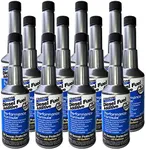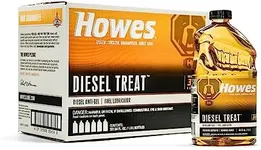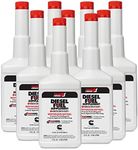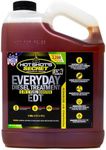Buying Guide for the Best Diesel Fuel Additives
Choosing the right diesel fuel additive can make a difference in your vehicle's performance, fuel efficiency, and overall engine health. With so many different products on the market, it can be confusing to know what features matter most and which ones match your needs. To make an informed choice, it's important to understand the key specifications and how they relate to what you want to achieve—whether that's cleaning your engine, protecting it from wear, improving cold-weather starting, or enhancing power output.Type (Function)The type of diesel fuel additive refers to what it is formulated to do, such as cleaning the fuel system, improving lubricity, preventing gelling in cold weather, boosting cetane, or dispersing water. This is important because not all additives serve the same purpose, and using the wrong one might not deliver the results you expect. Some additives are multi-purpose, but many are specialized. Generally, people who drive in cold climates look for anti-gel additives, while those concerned about engine wear might choose lubricity enhancers, and drivers wanting to clean their fuel system seek out detergents. Understanding your primary goal ensures you choose the type that suits your needs.
Cetane Number ImprovementCetane is a measure of how quickly and efficiently diesel fuel ignites under compression. Additives that improve cetane number can lead to easier starting, quieter operation, and improved power. Cetane boosters are usually most beneficial if your vehicle is experiencing rough starts, excessive smoke, or knocking. Cetane numbers usually range from 40 to 55, with higher numbers offering better ignition quality. If your fuel source has low cetane levels or your engine is struggling, choosing an additive with strong cetane boosting properties makes sense.
Lubricity EnhancementLubricity refers to the fuel’s ability to lubricate the moving parts within your diesel engine's fuel pump and injectors. Modern ultra-low-sulfur diesel fuels are lower in natural lubricity, so additives that enhance this characteristic can prevent premature wear and costly repairs. If your vehicle is newer or uses ultra-low-sulfur diesel, or you drive long distances often, an additive targeting lubricity should be a priority to ensure long-term engine health.
Anti-Gel/Cold Weather ProtectionAnti-gel additives prevent diesel from thickening when temperatures drop, making sure fuel still flows smoothly to the engine. This is particularly important in areas with cold winters, as gelling can prevent your vehicle from starting or running properly. The effectiveness depends on the lowest temperature it protects against, usually specified on the product. If you operate in a mild climate, this may be less important; in areas with freezing temperatures, it is essential.
Detergency (Cleaning Ability)Detergency indicates how well an additive can keep your fuel system clean by removing deposits from injectors, valves, and other components. This improves fuel atomization, engine performance, and can restore lost power and efficiency. If your engine has high mileage or you’ve noticed poor idling, smoke, or rough running, an additive with strong cleaning properties can help. For preventative maintenance, regular use of a detergent additive can keep your system running smoothly.
Water DispersionDiesel fuel can sometimes accumulate water through condensation or contaminated storage, which can lead to corrosion or microbial growth in your fuel system. Water-dispersing additives bind water so it can be safely eliminated. This is especially useful if you live in humid climates or use your vehicle infrequently, as idle fuel tanks are more prone to water accumulation. If these risks apply to you, choosing an additive with water dispersion properties is a smart move.
Treatment RatioThe treatment ratio tells you how much additive you need to treat a certain amount of diesel fuel, often expressed as ‘ounces per gallon’ or ‘milliliters per liter.’ This affects how often you need to buy and use the product. If you have a large vehicle or multiple tanks, a higher treatment ratio (meaning less additive per gallon) is more convenient. Tailor your choice to your usage patterns and vehicle’s fuel tank size.
















